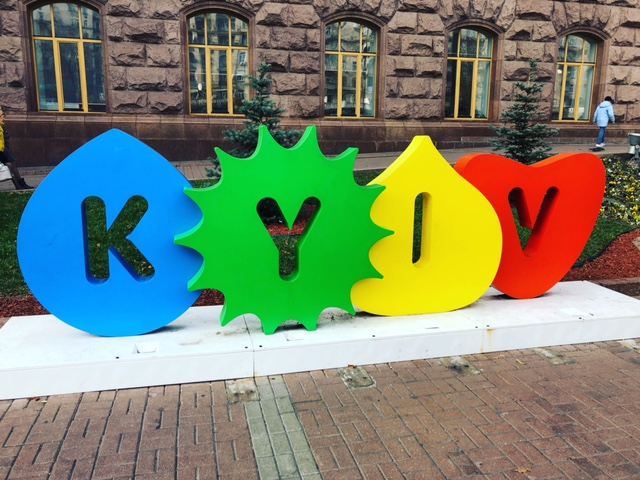French state-owned international news agency Agence France-Presse (AFP) has begun 2022 by adopting the Ukrainian-language derived “Kyiv” as their official spelling for the country’s capital city, replacing the Russian-rooted “Kiev.”
The change, which was announced by journalists on 3 January, makes AFP the latest in a growing number of media outlets to change from Kiev to Kyiv as Ukrainian transliterations of Ukrainian place names increasingly replace previously preferred Russian versions. In recent years, major international news agencies and media giants including Reuters, Associated Press, BBC, Washington Post, New York Times, Guardian, Wall Street Journal, and Euronews have all made the switch.
Asserting an Independent Identity
The rise of the “Kyiv” spelling represents the latest chapter in a long-running campaign to secure international recognition for Ukrainian-language transliterations and is part of a much broader post-Soviet drive to assert an independent Ukrainian identity.
These efforts have not always met with success. The Ukrainian authorities first endorsed “Kyiv” as the official English-language spelling back in the mid-1990s, but beyond the rarefied world of diplomatic protocol, most members of the international community paid no attention and continued with the more familiar “Kiev” instead.
This underwhelming response was symptomatic of the indifference shaping outside attitudes toward Ukrainian statehood during the first decades of the country’s independence. Indeed, prior to the outbreak of the Russo-Ukrainian War in 2014, many people wondered what all the fuss was about and dismissed calls to adopt Ukrainian spellings as the ravings of a nationalist fringe.
Others saw it as pure presumption on Ukraine’s part. Somewhat unfairly, critics asked why there was no similar clamor for the English-language rebranding of “Moscow” as “Moskva” or “Rome” as “Roma.” Such objections ignored the obvious imperial imposition evident in Ukraine’s case but markedly absent from other Anglicized European place names.
A far more meaningful comparison would be with post-colonial name changes in Asia such as the switch from Ceylon to Sri Lanka or the change from Bombay to Mumbai. However, few seemed to regard Ukraine’s own post-imperial sensitivities as worthy of the same consideration.
Putin’s War Changes Everything
All this changed when Russian President Vladimir Putin invaded Ukraine. It is no coincidence that international attitudes toward the “Kyiv vs. Kiev” debate have undergone a radical transformation since 2014.
Like so many other aspects of Ukrainian identity politics, Russia’s attack has electrified the issue, infusing it with entirely new meaning among domestic audiences and encouraging the outside world to think again. With Russian tanks parked in the Donbas and Moscow propagandists denouncing Ukraine as an accident of history, the continued use of Russian-language transliterations for Ukrainian towns and cities became not only absurd but also grotesque.
As a result, the pre-2014 trickle of institutions and media outlets embracing the “Kyiv” spelling has since become a flood. In addition to the international press, the list of post-2014 converts includes dozens of airlines and airports, numerous academic dictionaries and textbooks, and the hugely influential United States Board of Geographic Names.
Reversing Russification
Not everyone is cheering the triumph of Ukrainian transliteration. Cynics have long dismissed Ukraine’s post-independence name games as a populist sideshow that distracts from the more urgent tasks of fighting corruption and building a functioning economy. Changing the names of the country’s streets, towns, and cities will not put food on the table, they argue. This bread-and-butter approach is understandable in what remains one of Europe’s poorest societies, but it also misses the larger point.
To appreciate the true significance of the “Kyiv vs. Kiev” debate, one must first step back and view it in terms of Ukraine’s deep-rooted national identity crisis caused by centuries of Czarist and Soviet russification.
For hundreds of years, successive Russian leaders sought to absorb Ukraine into their country’s national heartlands, exploiting the cultural closeness between the two nations to overwhelm and incorporate historically Ukrainian lands. Changing political and ideological considerations had little impact on this overarching imperial objective, with czars and commissars equally committed to the downgrading of Ukrainian national identity.
The tools and tactics employed in pursuit of this goal reflected the sheer scale of the undertaking. Generations of Ukrainians found themselves subjected to everything from forced famines and mass deportations to educational apartheid and language bans, with wave after wave of population transfers serving to transform the demographic destiny of the country.
Meaningful Step
Centuries of relentless russification continue to cast a long shadow over independent Ukraine. Even now, Vladimir Putin still claims that Russians and Ukrainians are “one people” and openly questions the historical legitimacy of Ukrainian statehood.
Against this backdrop, Ukraine’s desire for the outside world to use Ukrainian-language transliterations appears anything but trivial. On the contrary, it is a plea for symbolic support in what is one of world history’s last great independence struggles.
Ukraine’s nation-building journey is far from over, but establishing Ukrainian names for Ukrainian places is clearly a step in the right direction towards historical justice. The international media’s adoption of the preferred “Kyiv” spelling may seem relatively inconsequential, but it represents a meaningful contribution to this process.
